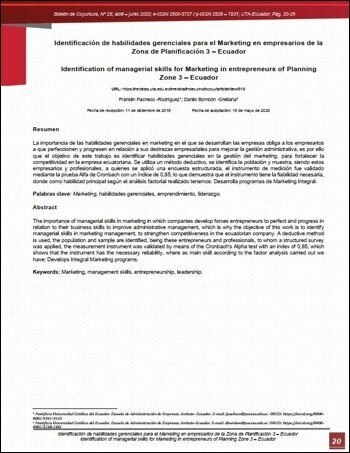Identification of managerial skills for Marketing in entrepreneurs of Planning Zone 3 – Ecuador
Main Article Content
Abstract
The importance of managerial skills in marketing in which companies develop forces entrepreneurs to perfect and progress in relation to their business skills to improve administrative management, which is why the objective of this work is to identify managerial skills in marketing management, to strengthen competitiveness in the Ecuadorian company. A deductive method is used, the population and sample are identified, being these entrepreneurs and professionals, to whom a structured survey was applied, the measurement instrument was validated by means of the Cronbach's Alpha test with an index of 0.85, which shows that the instrument has the necessary reliability, where as main skill according to the factor analysis carried out we have: Develops Integral Marketing programs.
URL: https://revistas.uta.edu.ec/erevista/index.php/bcoyu/article/view/918
Downloads
Article Details

This work is licensed under a Creative Commons Attribution-NonCommercial 4.0 International License.
![]()
The publications of the Boletín de Coyuntura are licensed under a Creative Commons Attribution-NonCommercial 4.0 International License (CC BY-NC 4.0). The Universidad Técnica de Ambato retains the copyright of the published works, and favors and allows the reuse of these, as long as: the authorship and original source of publication is cited, and they are not used for commercial or onerous purposes. The intellectual property of the published articles belongs to the authors.
References
Arango, J. (2017). Identificación de factores esenciales para la creación de empresas desde la perspectiva del emprendedor: el caso del Parque del Emprendimiento. Cuadernos de Contabilidad, 18 (45). Recuperado de http://www.scielo.org.co/pdf/cuco/v18n45/0123-1472-cuco-18-45-00110.pdf.
Ardura, I. (2007). Principios y estrategias de marketing. España: UOC (Universitat Oberta De Catalunya).
Belio, J. (2007). Conózca el nuevo marketing: el valor de la información. España: Especial Directivos Orense.
Coca, A. (2008). El concepto de Marketing: pasado y presente. Marcaibo Revista de Ciencias Sociales, 14 (2), 408.
Constitución de la República del Ecuador. (2008)
Consejo Educacion Superior (CES 2017). Reglamento de Regimen Académico.
Instituto Nacional de Estadísticas y Censos (INEC. 2017). Directorio de Empresas y Establecimientos
Ley Orgánica de Educación Superior (LOES. 2018).
López, C. (2016). El gerente competitivo y su rol en las mipymes: una perspectiva desde el marketing. Equidad & Desarrollo, (25), 209-224. doi: http://dx.doi. org/10.19052/ed.3726, 209.
Martínez, D. (2016). Factores Clave en Marketing Enfoque: Empresas de Servicios. Orbis. Revista Científica Ciencias, (12), 42-58p. Recuperado de https://www.redalyc.org/pdf/709/70946593003.pdf
Philip, K. (2008). Principios de Marketing. Mexico: Pearson Educacion S.A.
Plan Nacional de Desarrollo. (2017-2021). Versión digital en https://www.siteal.iiep.unesco.org/sites/default/files/sit_accion_files/siteal_ecuador_0244.pdf, 31p.
Porter, M. (2008). Estrategia Competitiva. Técnicas para el análisis de los sectores industriales y de la competencia. (38). Mexico: Grupo editorial Patria.
Secretaría Nacional de Educación Superior, Ciencia Tecnología e Innovación, SENESCYT. Plan de Ciencia, Tecnología y Saberes Ancestrales 2030.
Secretaría Nacional de Planificación y Desarrollo, SENPLADES. (2013, 2017). Agenda Zonal. Zona 3-Centro, 41 p.
Stanton, Etzel y Walker. (2007). Fundamentos de Marketing (14ª, 6). México: McGraw-Hill/Interamericana Editores, S.A.
Whetten, D., Kim, S. (2011). Desarrollo de habilidades directivas (8ª, 9) México: Pearson Educacion.
Yogesh, H. (2018). Servicio de marketing y estrategias de calidad. Núcleo, 6 (1), 182p. Recuperado de http://pen.ius.edu.ba/index.php/pen/article/download/291/218.


